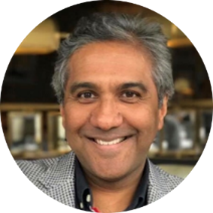
Professor Kausik Ray, BSc(hons), MBChB, MD, MPhil (Cantab), FRCP (Lon), FRCP (Ed), FACC, FESC, FAHA
Kausik Ray is Professor of Public Health at the School of Public Health, the Director of the Imperial Centre for Cardiovascular Disease Prevention and the Deputy Director of the Imperial Clinical Trial Unit, Imperial College London and a Consultant Cardiologist.
Professor Ray received his medical education (MBChB) at the University of Birmingham, his MD at the University of Sheffield, a postdoctoral fellowship at Harvard Medical School and an MPhil in epidemiology from the University of Cambridge.
Professor Ray’s research interests focus on preventing the global consequences of atherosclerosis through large-scale population studies evaluating the burden of disease and improving risk prediction and through the study of novel therapies in the setting of multi-centre international clinical trials to offer solutions to help prevent death and disability from cardiovascular disease. As such, he is the global PI of several ongoing Cardiovascular trials and registries.
His publications are included in the NEJM, Lancet, JAMA, Circulation, JACC and EHJ amongst others and have received over 54,000 citations (2019 H index of 68, i10 of 159) and in 2018 he was listed by Clarivate Analytics as among the top 1% of authors cited globally in clinical medicine.
The impact of his novel research findings has contributed to current US and European guidelines amongst others.
An active member of the EAS, Professor Ray has contributed to more than 6 EAS Consensus Panel statements, been an invited speaker at the EAS annual congress for several years, was an EAS program committee member for 2015 (Glasgow) and 2017 (Prague) as well as his ongoing contributions to masterclasses and other EAS educational activities. Since 2017 he has served on the EAS Executive committee.
In 2014 he independently initiated and obtained funding for the EAS FH studies collaboration, the first global registry of its kind, now encompassing over 68 countries and approximately 60,000 cases, for which he is the lead.
Prof Ray has worked extensively to extend the EAS mission across Europe, the Asia Pacific, Gulf region and Latin America through education and collaborations.
Finally, Prof Ray firmly believes in the need to encourage and mentor young scientists to become part of the EAS and to contribute to the prevention of atherosclerosis globally.
Manifesto
The EAS and its members have been at the forefront of atherosclerosis research, education and implementing evidence based treatments/guidelines in every corner of the world. The strength of the EAS rests in the diversity of its members and affiliated societies as well as its global reach.
As President, I will seek to build on these past achievements of the society and embrace the opportunities offered by the diversity and broad membership base.
The FHSC has provided the EAS with a global footprint and engaged new members from all around the world. Building on my proven track record in global leadership and inclusivity, I will look towards my extensive global network and partnerships with academics, clinicians and industry to help shape the activities of the society to the needs of its members and partners.
The core activities of the society need to be maintained through a sensible financial strategy, strategic partnerships both with industry and relevant societies, and ensuring a thriving high quality annual scientific meeting. However, the growth of the society and ultimately it’s sustainability requires that it be inclusive of its members and their evolving needs. This includes exploring opportunities to help support/ develop emerging scientists and clinicians globally through our affiliated members and partner societies in a sustainable fashion, ensuring that knowledge and best practice are disseminated and that the grass roots global membership thrives with opportunities provided for all.
The EAS, through its global standing and its membership, is in a unique position to help shape the agenda for research, clinical care and help guide policy and its implementation for the next decade around the world. I would like to see the EAS at the forefront of these activities.